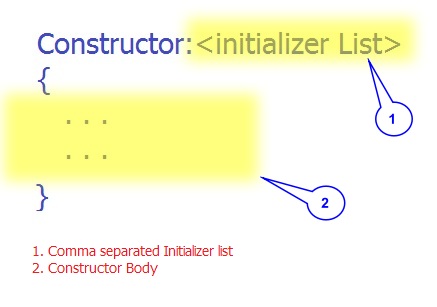Constructors:
constructors is special member function whose task is initialize the
object of it's class.
it is special because it's name is same that the class name.it is user
define member function.constructor is declare as follows.
class integer
{
int m,n;
public:
integer (); //constructor declare
};
integer ::
integer() //constructor define
{
m=n=0;
}
Properties of Constructors:
·
It allocates memory.
·
It initialize the data
member automatically when they declear.
·
The class name and
constructor name is always same.
·
Constructor do not return
any value.(not even void).
·
Constructor can overload.
·
Like other C+ + function ,constructor constructor can have
default value.
·
constructors can
not virtual.
·
we cant refer
constructor using its address.
you may have question what is difference between constructor and Normal
function.
·
Normal function return
value.
·
Normal function can be virtual.
·
We cant overload normal
function.
·
Normal function can not have
·
The class name and function
name is not same.
·
Normal function are called explicitly.
Types of constructor:
1. Default Constructor.
2. Parameterise Constructor.
3. Constructor with default Argument.
4. Copy Constructor.
5. Dynamic Constructor.
Default Constructor ::
The
Constructor which do not have any Parameter is called Default Constructor.
Below Is the code of default
Constructor.
#include<iostream>
class sample
{
public :
sample()
{
cout<<"I am default constructor";
}
};
int main()
{
sample ob;
returm 0;
}
Parameterised Constructor ::
C++ permits to pass
argument to the constructors when the object created.
the constructor that
can take arguments are called as parameterised constructor.
constructor can
accept any kind of values as a formal parameter.
#include<iostream>
class sample
{
public :
sample(int x)
{
cout<<"I
am Parametisezed constructor";
cout<< "i have value "<< x
}
};
int main()
{
sample ob(10);
returm 0;
}
Above code give the output:
I am Parametisezed constructor
i have value :10
Note:: When Constructor is parameterised Must provide
Appropriate arguments.
Constructor with Default Argument ::
#include<iostream>
class sample
{
public :
sample(int x=12);
};
sample :: sample(int num)
{
cout<<"
you enter num : " <<num;
}
int main()
{
int n;
int num;
sample ob();
cout<<"enter no ";
cin>>n;
sample ob1(n);
returm 0;
}
Copy Constructor ::
the name copy suggest
that the same reference can be used for anotherone, i.e either variable
functionally element as we knlowwe can copy one variable into another.
the copy constructor takes reference to an object of same class as itself
as argument.
syntax:
class name (class name & obj);
#include<iostream>
class sample
{
public:
sample()
{
cout<<"default constructor";
}
sample(sample &p)
{
cout<<"copy constructor";
}
};
int main()
{
sample ob;
sample ob2(ob);
// sample ob2= ob;
}
Dynamic constructor ::
When we create an object the memory allocation process done at the time of
using constructor.
if we create object initially it create the memory which is not required so
it results westage of memory initially.
since we create the object at the same time of construction that allocate
memory according to size,this method called as dynamic constructor.
#include <cstdlib>
#include<iostream>
using namespace std;
class dynamic
{
int i;
float f;
public:
void getdata();
void putdata();
};
void dynamic::getdata()
{
cout<<"enter the integer :-> ";
cin>>i;
cout<<"enter the float :-> ";
cin>>f;
}
void dynamic::putdata()
{
cout<<"\n the integer is "<<i;
cout<<"\n the float is "<<f;
}
//malloc,new and delete is the dynamic memory allocation
and dealoocation oprator.
int main(int argc, char** argv) {
dynamic *ob;
ob=new
dynamic; //when memory dynamically
created we use pointer to point them because when memory dynamically created it
//generally created the address of that value so we need the pointer to
point that value using its address.
(*ob).getdata();
/*ob->getdata();
ob->putdata(); */
(*ob).putdata();
delete ob;
return 0;
}

Comments
Post a Comment